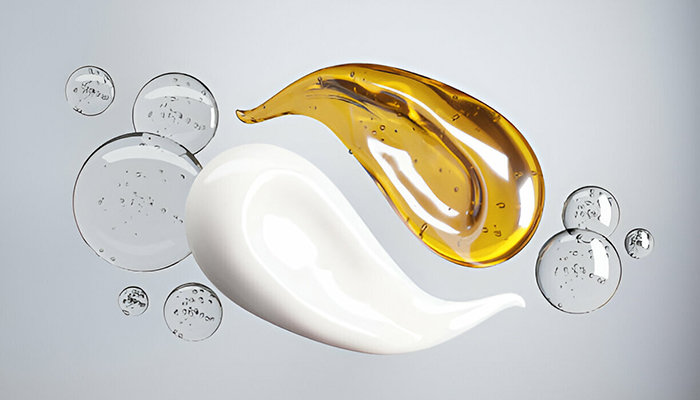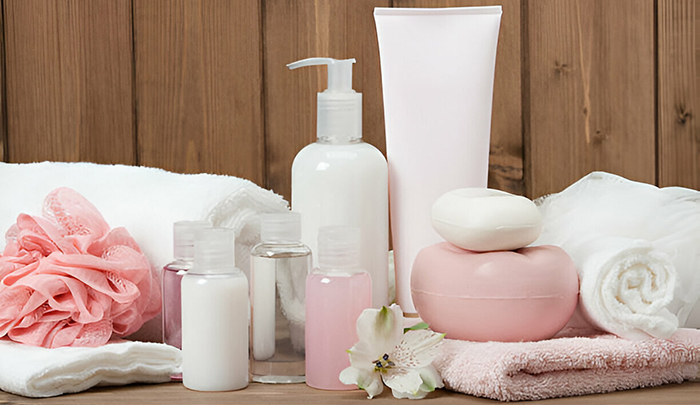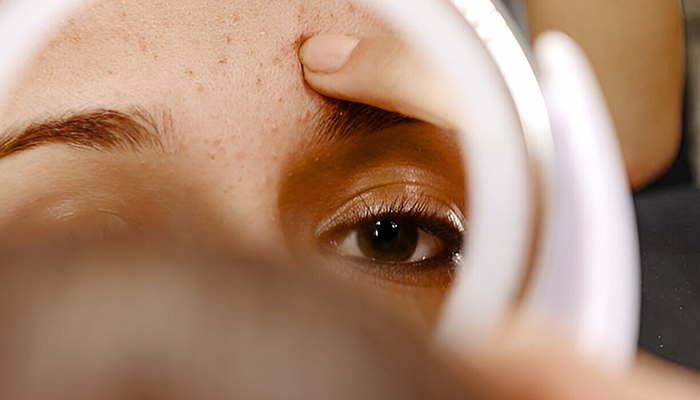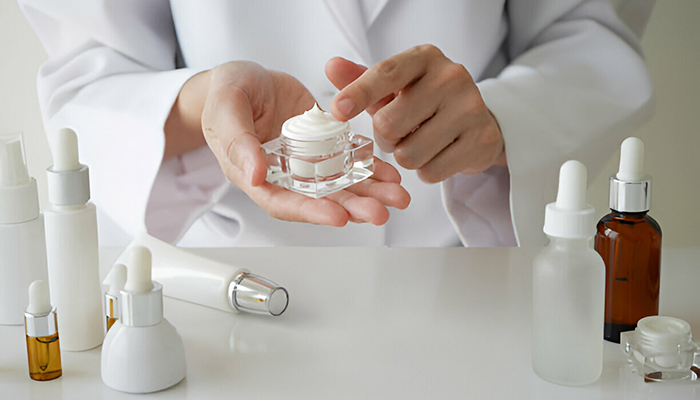Comprehensive Guide to Oily Skin Care

Introduction: The Importance of Understanding Oily Skin and the Challenges of Caring for It
If you think oily skin is a curse, you might need to reconsider this belief. The truth is that oily skin, which produces excess oils, can be challenging at times, but it also has potential benefits. However, to make the most of these benefits, we first need to understand the nature of oily skin and how to effectively care for it.
Oily skin, characterized by shine and enlarged pores, can result from several factors, including hormonal changes, genetics, diet, and even stress. While dealing with it can be difficult at times, understanding how to balance the natural oils in your skin can be the key to maintaining healthy and radiant skin.
Oily skin requires a slightly different care routine than dry or normal skin. However, products that help control oil and reduce shine can be beneficial. Nevertheless, it’s important not to over-dry the skin, as this may stimulate it to produce more oil.
In the end, caring for oily skin requires a careful balance between controlling excess oil and maintaining skin hydration. By using the right products and following a healthy daily routine, you can keep your skin clean, healthy, and glowing.
Understanding Oily Skin: What is Oily Skin and What Factors Affect It?
In this section, we will provide you with a deeper understanding of oily skin and the factors that affect it. Oily skin is a type of skin characterized by the secretion of larger amounts of oil naturally, which can lead to clogged pores and the appearance of pimples and blackheads.
Oily skin is influenced by several factors, including hormonal changes, genetics, nutrition, and stress. Hormonal changes, such as those occurring during the menstrual cycle, pregnancy, or due to certain medications, can increase oil production. Additionally, genetics can play a role in determining the level of oiliness in your skin.
Nutrition also plays a significant role in the health of your skin. Some experts believe that foods rich in fats and sugars can increase oil production. The positive side is that oily skin acts as a natural barrier that helps keep the skin moisturized and protected.
If you’re dealing with oily skin, identifying your own factors that contribute to excess oil can help you improve your skincare routine and achieve a better balance. Remember, it’s not the oil itself that’s the problem, but rather how you deal with it.
The factors causing oily skin: Genetics, hormones, and environmental factors.
Oily skin” is a problem faced by many people around the world, and it is a phenomenon caused by the skin’s production of more oils than necessary. These excess oils create a greasy layer on the skin’s surface, leading to the appearance of impurities, pimples, and blackheads. But what are the factors causing oily skin? There are three main factors: genetics, hormones, and environmental factors.
Heredity is one of the most common factors in determining skin type. If one parent has oily skin, the chances increase that their children will also have oily skin. The presence of genetic factors that increase oil production can have a significant impact on skin type.
Hormones also play a significant role in determining skin type. During certain life stages such as adolescence, pregnancy, menstruation, and menopause, hormonal changes can lead to increased oil production. This increase in oil production can result in oily skin.
Environmental factors also influence skin type. Exposure to ultraviolet radiation, humidity, and excessive heat can lead to increased oil production in the skin. Additionally, some skincare and cosmetic products can make the skin oilier.
In conclusion, genetics, hormones, and environmental factors are the primary causes of oily skin. However, with proper care and choosing the right products, it is possible to control excess oils and maintain healthy, balanced skin.

The Impact of Diet on Oily Skin: Foods to Avoid and Beneficial Foods
In the next section of the article, we will discuss “The Impact of Diet on Oily Skin: Foods to Avoid and Beneficial Foods.” In this context, food is considered a key factor that affects the health of oily skin.
اFoods high in sugars and saturated fats may increase oil secretion in the skin, leading to deterioration in the health of oily skin. Among these are fried foods, sugary desserts, and foods high in saturated fats such as fast food and red meat.
On the other hand, there are many foods that can help improve the health of oily skin. Foods rich in omega-3 fatty acids such as fatty fish, walnuts, and flaxseeds can help reduce inflammation and improve skin health.
Additionally, foods rich in fiber such as fruits, vegetables, and whole grains can help improve digestive health, which positively reflects on the health of oily skin.
Finally, it’s important to remember that healthy skin starts from within. Therefore, improving your diet and making healthy lifestyle changes can have a significant positive impact on the health of oily skin.
In conclusion, food should be considered as part of the solution, not the sole cause of oily skin issues. Consulting a dermatologist is the first step towards achieving optimal skin health.
Daily Skincare Routine for Oily Skin: Basic Steps for Daily Care
One of the concerns that occupies many women is searching for effective ways to care for oily skin, as this skin type requires a lot of care and attention. In this article, we will provide you with a daily skincare routine for oily skin, and the basic steps you should follow to maintain the beauty of your skin.
The first step is daily cleansing. You should use a gentle cleanser that deals with excess oil on the skin without drying it out. It’s preferable to use cleansers that contain aloe vera or green tea, as they help soothe the skin and reduce oiliness.
The second step is using a toner. Using an alcohol-free toner after cleansing helps remove any remaining residue from cleanser or makeup, and also helps reduce the size of pores.
The third step is moisturizing. Some may think that oily skin doesn’t need moisturizing, but this is not true. Oily skin needs moisturizing as much as dry skin does, but it’s important to choose a lightweight and non-greasy moisturizer.
The fourth step is using sunscreen. Oily skin is more prone to damage from ultraviolet rays, so you should use a sunscreen that protects your skin from harmful rays.
Review your daily routine and the products you regularly use, as oily skin can be the result of using inappropriate products. Always remember that good skincare starts from within, so take care of your diet and lifestyle, and you’ll notice the difference in your skin.

Choosing the Right Products: The Best Products for Oily Skin, Including Cleansers, Moisturizers, and Creams
Title: “Choosing the Right Products: The Best Products for Oily Skin, Including Cleansers, Moisturizers, and Creams”
It is essential to recognize that oily skin requires special care and specific products to maintain its health and freshness. If you have oily skin, choosing the right products can be challenging due to the many options available in the market.
Oily skin is characterized by excessive sebum production, leading to the formation of blackheads, acne, and excess shine. Therefore, choosing the right skincare products is a crucial step in maintaining clean and healthy skin.
Firstly, for cleansers, it’s preferable to choose a gentle cleanser that contains natural ingredients to help control oil, such as aloe vera and green tea. It’s also advised to avoid cleansers that contain alcohol, as they can dry out the skin and increase oil production.
Secondly, when choosing a moisturizer for oily skin, make sure it is oil-free and contains ingredients that help reduce shine, such as silica. You can also opt for moisturizers containing salicylic acid, which helps prevent the formation of blackheads and acne.
Finally, concerning creams, it’s essential to choose a cream that contains SPF to protect the skin from the sun’s rays, which can increase oil production.
In the end, caring for oily skin requires patience and diligence, but with the right products, you can maintain healthy, clean, and shine-free skin.
Tips for Suitable Makeup: How to Choose and Use Makeup for Oily Skin Correctly
If you have oily skin, you may find it challenging to find the right makeup that lasts long and doesn’t clog pores. In this section, we’ll provide you with a set of effective tips for choosing and using makeup for oily skin correctly.
Firstly, it’s essential to choose products that contain ingredients to control oil. Many makeup products designed for oily skin contain ingredients like kaolin and silica, which help absorb excess oil from the skin.
Secondly, you may want to consider using a matte foundation instead of a dewy one. A matte foundation will help reduce shine and provide a natural look to the skin.
Thirdly, avoid using products that contain oils and parabens, as they can increase oil production and cause acne.
Fourthly, use pressed powder to set the foundation and absorb excess oil. Use a large brush to evenly distribute the powder on the face.
Fifthly, choose your foundation brush carefully. A brush with natural bristles is better for oily skin because it absorbs excess oil.
Sixthly, use a primer before applying foundation. Primer helps reduce the appearance of pores and prevents makeup from slipping.
In the end, remember that oily skin requires proper care and attention. Use specialized cleansing products for oily skin and make sure to moisturize regularly.
Skincare for oily skin in different seasons: Adapting the routine to weather changes
Skincare for oily skin is important all year round, but it requires specific adjustments to the daily routine based on weather changes. Here are some valuable tips for caring for oily skin in different seasons.
In summer, oily skin becomes oilier due to the heat and humidity. Therefore, it’s important to use a light, non-greasy cleanser containing salicylic acid or glycolic acid to help control excess oil. Additionally, use an oil-free sunscreen with broad-spectrum protection to shield the skin from sun damage.
In winter, oily skin may become dry due to the cold weather and winds. In this case, it’s important to switch to a creamy cleanser to maintain moisture. Additionally, use a lightweight but effective moisturizer to keep the skin hydrated without aggravating excess oil.
In spring and autumn, it’s important to update the daily routine for caring for oily skin to adapt to the moderate weather changes. You can use a gentle cleanser and oil-free moisturizer, in addition to applying sunscreen daily.
It’s also important to consider using skincare products that contain natural ingredients like aloe vera and green tea, which help control oil and soothe the skin. Don’t forget that a healthy diet and adequate sleep also play a crucial role in skin health.
By following these tips, anyone with oily skin can maintain healthy and beautiful skin throughout all seasons.

Skincare for Oily Skin in Adolescence: Tips for Teenagers to Maintain Healthy Skin
Oily skin is considered one of the common problems faced by teenagers, but with some simple tips, it’s possible to improve skin health and maintain its beautiful appearance. First, we should know that oily skin is a result of the sebaceous glands in the skin producing larger amounts of oil, which can lead to the appearance of pimples and enlarged pores.
One of the key strategies for caring for oily skin is daily cleansing. Use a gentle cleanser that contains oil-fighting ingredients such as aloe vera and green tea. Avoid using products that cause skin dryness, as this may lead to the sebaceous glands producing more oil. It’s also recommended to wash the face twice a day to reduce oil buildup.
Add to your routine the use of toner. Toner helps to deeply cleanse pores and remove excess oil. Look for a product that contains salicylic acid or alpha hydroxy acids, as they work to gently exfoliate the skin and reduce oiliness.
Moisturizing the skin is a fundamental step that should not be ignored, even if your skin is oily. Use a lightweight, oil-free moisturizer that can maintain skin hydration without adding extra oil.
A healthy diet also plays a crucial role in caring for oily skin. Try to include plenty of vegetables and fruits in your diet, and avoid foods rich in fats and sugars.
In the end, remember that oily skin is not a flaw, but it simply requires a little care and attention to look its best.
Acne and Pimple Treatment: How to Effectively Deal with the Problem of Acne
In the next section of the article, we will delve into the topic of ‘Acne Treatment: How to Effectively Deal with Acne Problems.’ This common and complex issue requires a lot of attention and care, especially for those with oily skin.
Oily skin is one of the skin types most prone to acne and pimples, but there’s no need to worry! There are plenty of solutions and effective ways to deal with this issue.
Firstly, it’s important to remember that regular skin cleansing is the first step in combating acne. Use a gentle, oil-free cleanser to remove impurities and oils from the skin. Remember to wash your face twice a day – in the morning and before bedtime.
Secondly, use products containing antibacterial ingredients such as sulfur and green tea. These ingredients help kill the bacteria that cause acne and reduce irritation and inflammation.
Thirdly, if you have oily skin, you may benefit from using clay masks, which help absorb excess oils and reduce shine. Use them once or twice a week for best results.
In the end, remember that patience is key. Healing from acne may take some time, but with proper care and patience, you will achieve clean and healthy skin in the end.

Expert Consultation: The Role of Dermatologists and Skin Care Experts in Treating Oily Skin
In this section of the article, we will discuss the role of dermatologists and skin care experts in treating oily skin, as well as the challenges that these doctors may face in this field.
Oily skin is a problem faced by many, but the solution is within reach. Therefore, dermatologists and skin care experts play a crucial role in providing advice and effective treatments to deal with this type of skin. These experts can offer many solutions, ranging from daily skincare routines to advanced medical treatments.
One of the effective methods that skin experts can use to treat oily skin is providing advice on how to properly cleanse the skin. This may include using gentle cleansing products that remove excess oils without drying out the skin. Additionally, they may encourage avoiding products that contain alcohol, which can cause skin dryness.
It’s worth mentioning that dermatologists and skin care experts are not only specialized in providing treatments but also in identifying the causes of oily skin. This type of examination can help determine the best suitable treatments for individual cases.
In conclusion, oily skin is not an unsolvable problem. By turning to dermatologists and skin care experts, individuals can receive the advice and treatment they need to maintain healthy and balanced skin.
Natural Skincare for Oily Skin: Using Natural Ingredients to Improve Skin Health
Oily skin is characterized by excess shine and enlarged pores, which can be bothersome for some. However, with proper care, this skin type can be a source of unmatched strength and beauty. Therefore, using natural ingredients in a skincare routine can be an effective and healthy option for dealing with oily skin.
Firstly, lemon is considered one of the best natural treatments for oily skin. It contains citric acid, which acts as a natural exfoliant and helps reduce oil secretion and purify pores. You can simply rub a slice of lemon on your face and leave it for 10 minutes, then rinse it off with lukewarm water.
Secondly, honey is a wonderful natural moisturizer that can be used to control oily skin. You can apply honey to your face as a mask for 15 minutes, then rinse it off with warm water.
Thirdly, Aloe Vera, also known as Aloe, is another useful natural remedy for oily skin. Aloe Vera leaves contain a gel-like substance that can be used as a skin moisturizer, as well as help reduce oil and soothe irritation.
In conclusion, when we talk about caring for oily skin naturally, it’s essential to remember that proper nutrition plays a crucial role in skin health. Make sure to consume plenty of vegetables, fruits, and plant-based proteins as they contain the vitamins and minerals your skin needs to stay healthy and radiant.
In the end, taking care of oily skin is not difficult; it just requires a willingness to care for your skin and choose the right natural ingredients.
Healthy Nutrition for Oily Skin: Beneficial Foods and Supplements
If you’re dealing with ‘oily skin,’ you may be searching for effective ways to manage it. However, you may not have considered that the solution could lie in the food you eat. The truth is that proper nutrition plays a crucial role in the health of your skin, and beneficial foods and supplements can contribute to improving oily skin.
Firstly, foods rich in Omega-3 fatty acids such as fatty fish and walnuts can help reduce oiliness in the skin. These healthy fatty acids work to control oil production and improve overall skin health.
Secondly, foods rich in vitamins such as vitamins A, C, and E can provide essential support for oily skin. These vitamins help strengthen the skin and maintain the natural balance of oil, preventing clogging and breakouts.
Thirdly, dietary supplements can also become part of the diet for oily skin. For example, zinc supplements, known for their ability to reduce inflammation and improve oily skin control.
In conclusion, proper care for oily skin requires more than just using the right products. A healthy diet and dietary supplements can contribute to maintaining clean and healthy skin. Following a diet rich in nutritious foods and healthy supplements can help improve oily skin and maintain its health in the long run.
Conclusion: The Importance of Consistency in Oily Skin Care Routine and Its Impact on Self-Confidence and Overall Appearance.
Maintaining oily skin requires a meticulous and consistent skincare routine, as its needs differ from other skin types. In addition to deep cleansing, emphasis should also be placed on moisturizing and sun protection. While this may seem exhausting at times, the long-term benefits outweigh the effort.
Self-confidence is greatly influenced by the appearance of the skin. When your skin is clean and healthy, it shows, and people are drawn to you. Properly cared for, oily skin can look radiant, bright, and full of vitality.
Therefore, it’s important to continue with your skincare routine for oily skin to achieve the best results. Use appropriate products, drink plenty of water, and follow a healthy diet. Remember, oily skin requires a little more love and care than other types, but the results make it all worthwhile.
In the end, remember that you’re doing this for yourself, to feel comfortable and confident in your own skin. Oily skin isn’t a flaw, but rather an opportunity to get to know your body better and take care of it. And when you start seeing improvements, you’ll feel a boost in confidence and satisfaction with yourself, and that’s the ultimate goal for each of us.
